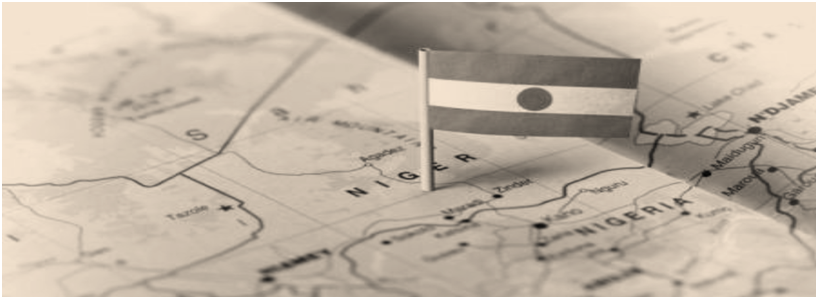
Weekly Highlight
- COVID-19: 9 new positive cases registered
- Coronavirus: Niger extends partial lockdown by 2 weeks
- Niger COVID: places of worship and schools will be open on June 1 in the event of improvement
- Agadez: details of the US Army drone crashed 23 Apr 2020
- Niger exchange rate – Exchange rates West African CFA franc – USD = 600.164 XOF XOF= 0.00166621 USD
EXECUTIVE SUMMAR
COVID-19: 9 new positive cases registered
Nine new positive cases out of 46 tests carried out are registered on May 1, 2020. The regions of Agadez and Diffa affected. As of Friday, May 1, 2020, virological examinations, the results of which have reached the Covid-19 pandemic management committee, present nine (9) New positive cases out of 46 tests carried out. According to the Coronavirus case release, there are 4 female and 5 male cases. These nine (9) New cases come from the regions of Niamey, Agadez and Diffa with respectively 6 cases, 1 case and 2 cases. “One death has been recorded,” adds the same source. This brings to 33 the number of deaths recorded since the onset of this disease in Niger, the first case of which was officially reported last March. As of May 1, 2020, out of 2,967 patients tested, 728 were declared positive for Covid-19, of which 217 are being treated, 478 were cured and 33 deaths recorded.
Coronavirus: Niger extends partial lockdown by 2 weeks
The Niger government has announced a partial extension of the lockdown of the state for another two weeks in order to achieve the desired result of minimising the spread of the Coronavirus. Gov. Abubakar Bello of Niger made this disclosure to newsmen after a joint Executive Council and COVID-19 Taskforce meeting in Minna on Monday. He explained the decision reached during the meeting was that “people would now be allowed to move within their immediate environment with compliance with the physical distancing and wearing of the face mask. Bello said that there would no vehicular movement during the lockdown days except those on essential services, adding that a window period such as April 28, May 1 and May 3 are given within the week for people to go out and purchase foodstuff.
Niger COVID: places of worship and schools will be open on June 1 in the event of improvement
The Council of Ministers notes that following an evaluation dated April 29, 2020, the Group of Experts notes a favorable development of certain epidemiological indicators of the COVID-19 pandemic in Niger, which shows that the efforts made by the populations to comply with the measures taken by the Government are beginning to produce the expected effects. In order to consolidate these favorable signals, the renewal of all the measures in force for two weeks is necessary, as well as particular attention for the respect of these measures by the populations in general and by the Nigeriens who have just been repatriated from some neighboring countries.
Agadez: details of the US Army drone crashed 23 Apr 2020
According to sources contacted on the spot, the aircraft, registered US Army 02197, was damaged on Thursday, April 23, 2020 at 9 a.m. Less than a kilometer from a camp not far from the village of Aghlal’ingharen, located 35 km from the city of Agadez on the Tahoua road. The gendarmerie, alerted by the villagers, first secured the site, before returning the next day with the Americans to remove the armed device and blow up the rest of the equipment. Another US Army aircraft, registered 02188, was damaged on February 29 in Anwaitaram, a village 50km from Timia. According to a security source, these drones are carrying out targeted raids in Libya.
USEFUL INFORMATION
List of holidays in Niger 2020
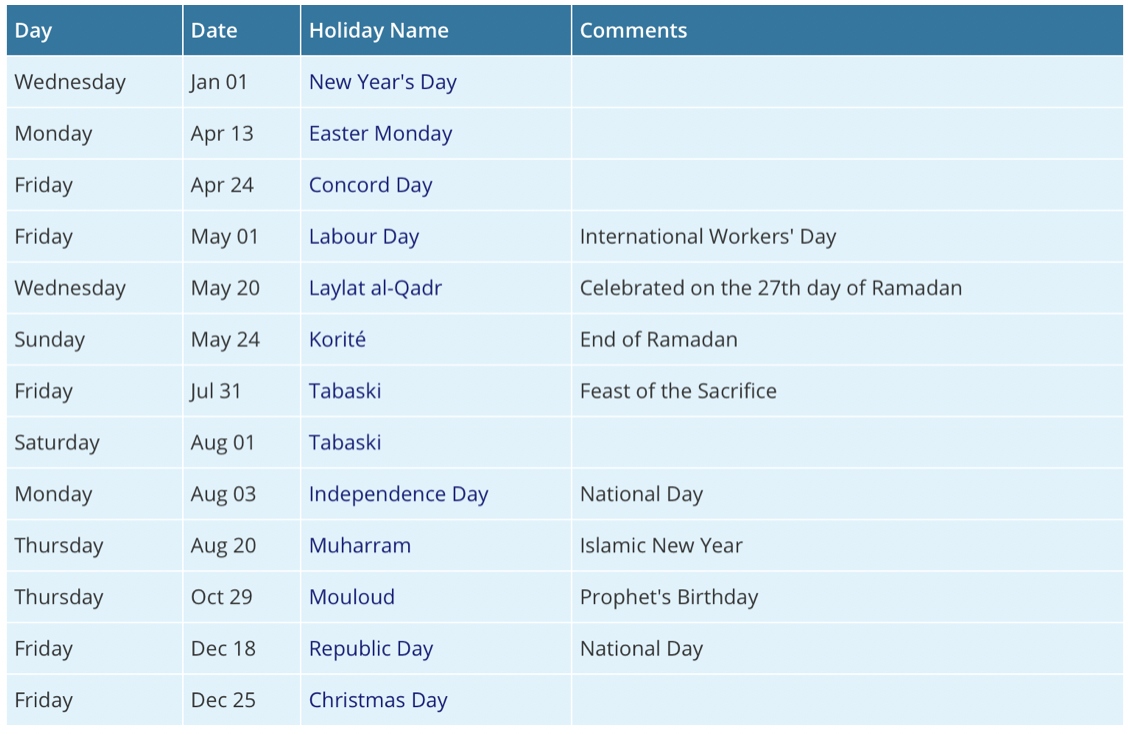
Exchange rates West African CFA franc
According to our most recent information (04th May 2020) the West African CFA franc has the following exchange rates.
The exchange rate from your own bank or credit card company will differ somewhat from the exchange rates as mentioned above. Your bank or credit card company might also apply additional international charges.
| USD = 600.164 XOF | XOF= 0.00166621 USD |
| EUR = 655.957 XOF | XOF= 0.00152449 EUR |
| **As at 04 May 2020 |
FREQUENTLY ASKED QUESTIONS ABOUT CORONA-VIRUS DISEASE (COVID-19
COVID-19 Basics
Q: What is COVID-19?
A: COVID-19 is a virus strain, first identified in Wuhan, Hubei Province, China, that has only spread in people since December 2019.
Health experts are closely monitoring the situation because little is known about this new virus and it has the potential to cause severe illness and pneumonia in some people.
Q: How does COVID-19 spread and what are the symptoms?
A: COVID-19 is primarily spread through respiratory droplets. That means to become infected, you generally must be within six feet of someone who is contagious and come into contact with these droplets. It may be possible to get COVID-19 by touching a surface or object that has the virus on it and then touching your mouth, nose, or possibly their eyes, Symptoms of COVID-19 appear within two to 14 days after exposure and include fever, cough, diarrhea and shortness of breath.
Q: How long does it take for symptoms of the COVID-19 to appear?
A: The CDC believes that symptoms of COVID-19 may appear in as few as two days, or as long as 14 days after exposure.
Q: How is COVID-19 treated?
A: There is currently no FDA approved medication for COVID-19. People infected with the virus should receive supportive care such as rest, fluids and fever control, to help relieve symptoms. For severe cases, treatment should include care to support vital organ functions.
Prevention
Q: Is there a vaccine?
A: Currently, there is no vaccine available.
Q: How can I best protect myself?
A: Practice the following:
- Wash your hands with soap and water for at least 15-20 seconds. If soap and water are not available, use a hand sanitizer with at least 60% alcohol.
- Avoid touching your eyes, nose and mouth with unwashed hands.
- Avoid close contact (within 6 feet) with people who are sick.
- Stay home when you are sick.
- Cover your cough or sneeze with a tissue, then throw the tissue in the trash.
- Standard household cleansers and wipes are effective in cleaning and disinfecting frequently touched objects and surfaces.
- It’s currently flu and respiratory disease season and CDC recommends getting vaccinated, taking every preventive actions to stop the spread of germs, and taking flu antivirals if prescribed.
Q: Should I wear a face mask? Will that help protect me?
A: If you are sick: You should wear a facemask when you are around other people (like sharing a room or vehicle) and before you enter a building. If you are not able to wear a facemask (for example, because it causes trouble breathing), then you should do your best to cover your coughs and sneezes, and people who are caring for you should wear a facemask if they enter your room.
If you are not sick: You do not need to wear a facemask unless you are caring for someone who is sick (and they are not able to wear a facemask). Facemasks may be in short supply and they should be saved for caregivers.
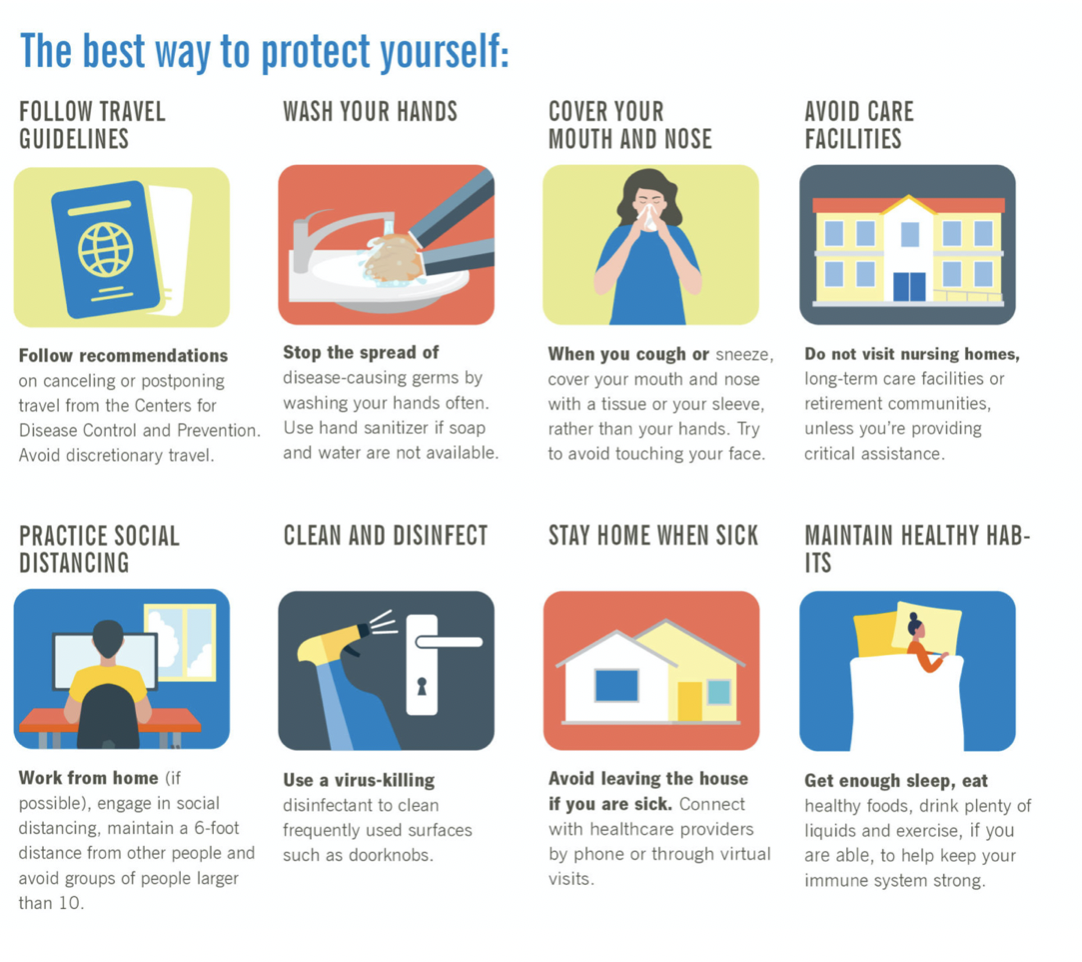
MEDICAL REQUIREMENTS AND INFORMATION
Vaccinations required to enter the country
Proof of vaccination against yellow fever is required over one year of age entering the country. The government of Niger recommends vaccine for travelers departing Niger.
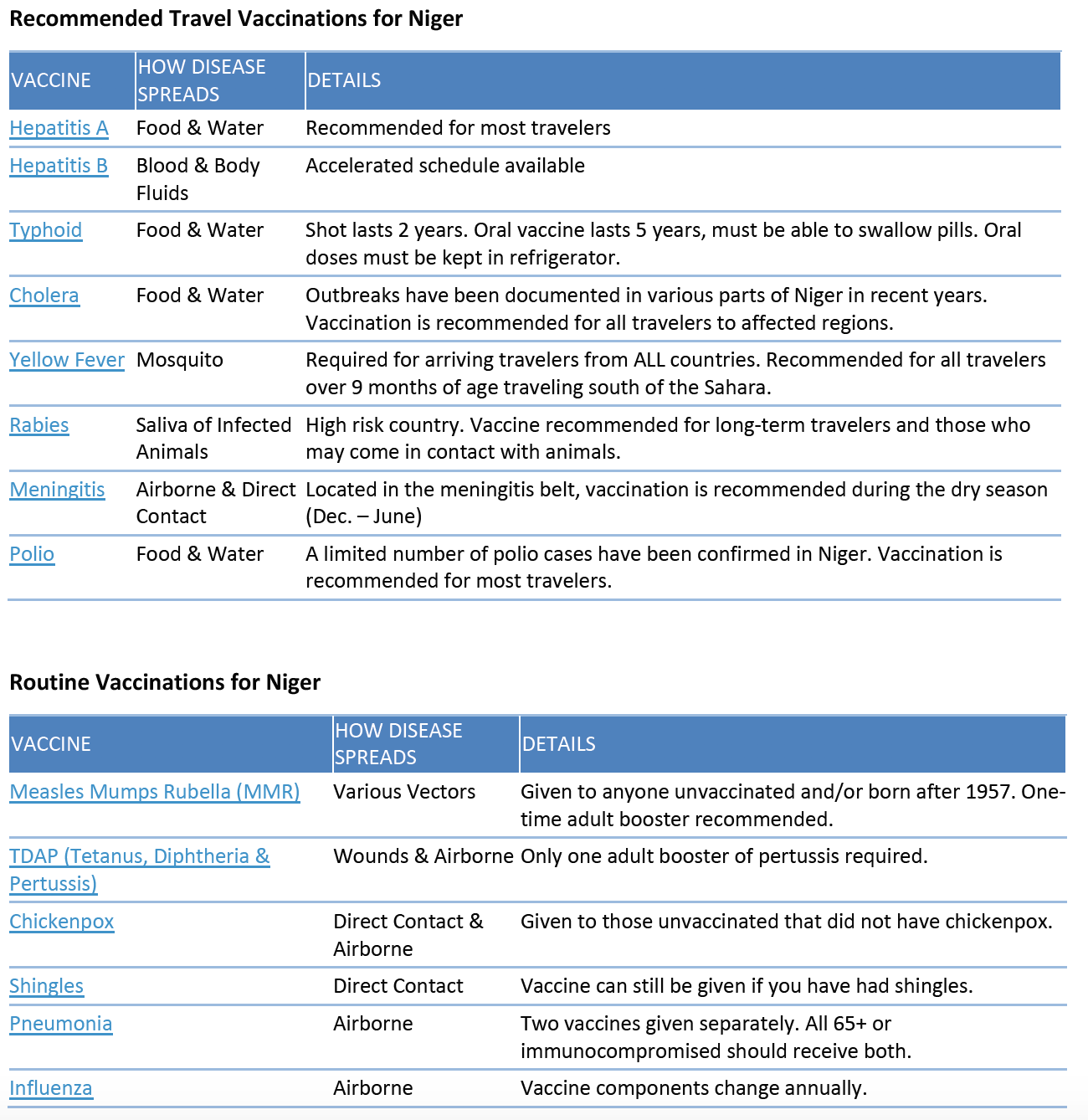
NIGER SECURITY & RISK LEVELS
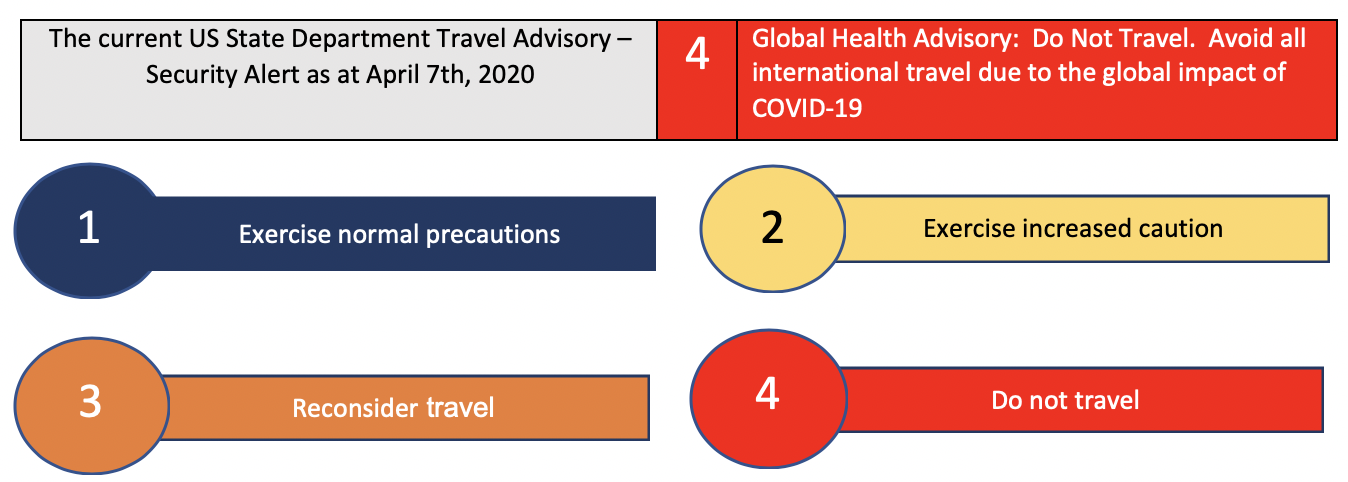
Global Health Advisory
The Department of State advises U.S. citizens to avoid all international travel due to the global impact of COVID-19. In countries where commercial departure options remain available, U.S. citizens who live in the United States should arrange for immediate return to the United States, unless they are prepared to remain abroad for an indefinite period.
At present the Department of State is making every effort to assist U.S. citizens overseas who wish to return to the United States. As the Covid-19 situation develops, our ability to provide such assistance working with commercial airlines or arranging for evacuation flights may become more limited or even unavailable. In recent weeks, commercial airlines have significantly reduced flight schedules and countries have closed airports and borders with little advance notice. If you wish to return to the United States, you should make arrangements to do so now and contact the nearest U.S. Embassy or Consulate for assistance as needed. There is no guarantee that the Department of State will be able to continue to provide repatriation assistance and transportation options to the United States may be unavailable in the future. If you choose to remain overseas, you should be prepared to remain where you are for the foreseeable future.
U.S. citizens who live abroad should avoid all international travel. Many countries are experiencing COVID-19 outbreaks and implementing travel restrictions and mandatory quarantines, closing borders, and prohibiting non-citizens from entry with little advance notice. Airlines have cancelled many international flights and several cruise operators have suspended operations or cancelled trips. If you choose to travel internationally, your travel plans may be severely disrupted, and you may be forced to remain outside of the United States for an indefinite timeframe.
On March 14, the Department of State authorized the departure of U.S. personnel and family members from any diplomatic or consular post in the world who have determined they are at higher risk of a poor outcome if exposed to COVID-19 or who have requested departure based on a commensurate justification. These departures may limit the ability of U.S. Embassies and consulates to provide services to U.S. citizens.
If you decide to travel abroad or are already outside the United States:
- Consider returning to your country of residence immediately using whatever commercial means are available.
- Have a travel plan that does not rely on the U.S. Government for assistance.
- Review and follow theCDC’s guidelines for the prevention of coronavirus.
- Check with your airline, cruise lines, or travel operators regarding any updated information about your travel plans and/or restrictions.

NIGER INCIDENT MAPPING
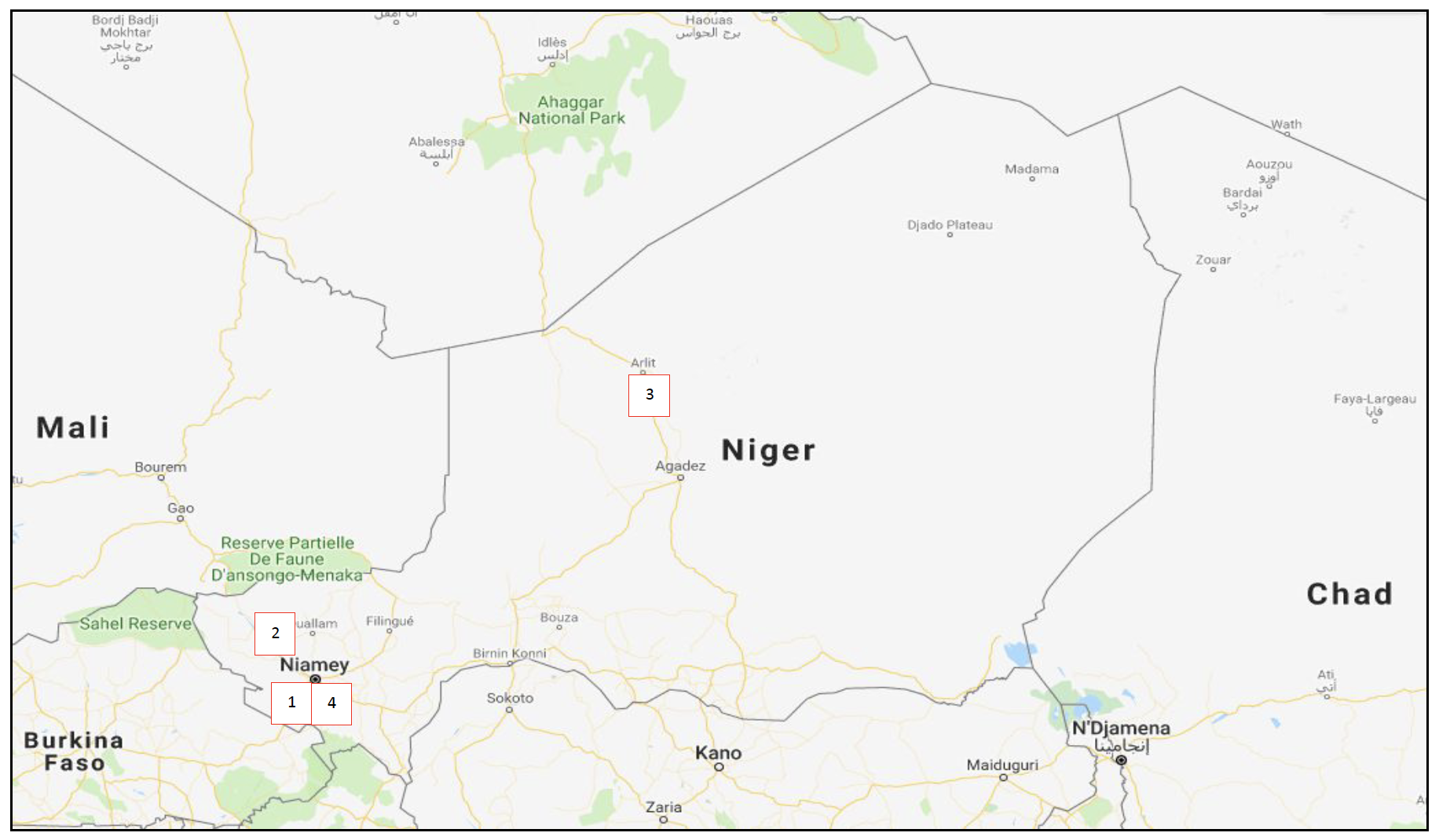
NIGER INCIDENTS IN DETAIL
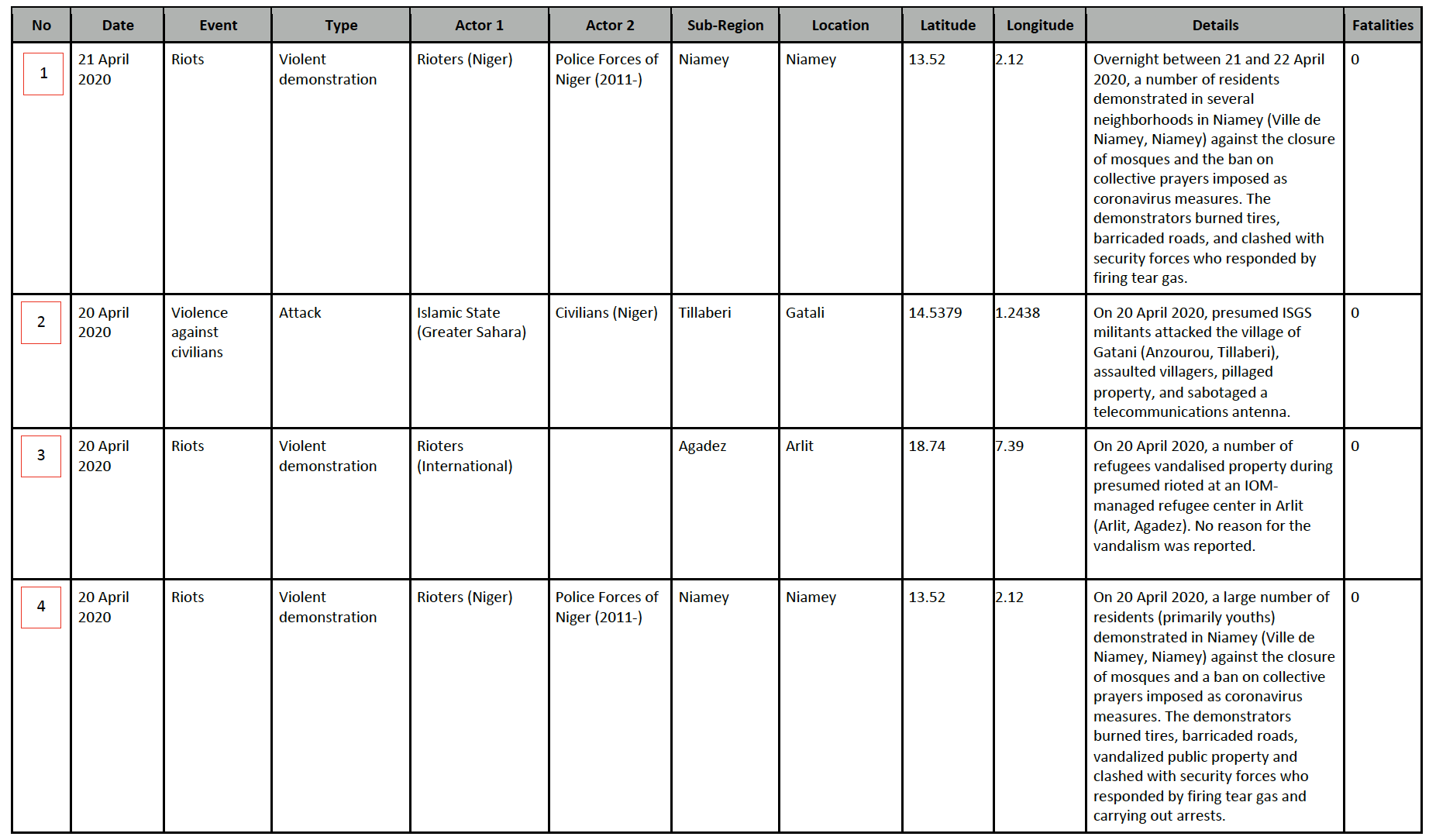
Agadez: details of the US Army drone crashed Thursday, 23 Apr 2020
According to sources contacted on the spot, the aircraft, registered US Army 02197, was damaged on Thursday, April 23, 2020 at 9 a.m. Less than a kilometer from a camp not far from the village of Aghlal’ingharen, located 35 km from the city of Agadez on the Tahoua road.
The gendarmerie, alerted by the villagers, first secured the site, before returning the next day with the Americans to remove the armed device and blow up the rest of the equipment. Another US Army aircraft, registered 02188, was damaged on February 29 in Anwaitaram, a village 50 km from Timia. According to a security source, these drones are carrying out targeted raids in Libya.
POLITICAL OVERVIEW
The President of the Republic, HE Mr. Issoufou Mahamadou, participated on Tuesday afternoon, April 28, 2020, in the Summit by videoconference between the Heads of State of the G5 Sahel and the European Union (EU), represented in particular by the President of the Council, Mr. Charles Michel and the President of the Commission Mrs. Ursula Von Der Leyen. UN Deputy Secretary General Ms. Amina Mohamed and the Chairperson of the African Union (AU) Commission Mr. Moussa Faki Mahamat also participated in this conference. In a speech, President Issoufou Mahamadou said that if the health crisis caused by the Covid 19 should last until the end of the year, the Sahel will experience a triple crisis: health, security and economic.
As part of the fight against the Covid-19 pandemic, Nigerien parliamentarians and the administrative and technical staff of the National Assembly handed over an amount of fifty million (50,000,000) FCFA to the financial and accounting management cell of fight against the Covid-19. The donation was presented this Thursday, April 30, 2020 by the six presidents of the parliamentary groups composing the National Assembly. In receiving this donation, the Director of the Prime Minister’s Office, Mr. Hamadou Adamou Souley, first thanked the donors for their gesture, but also and above all “for the immense efforts they provide on a daily basis as part of awareness-raising in the proximity of our populations on the barrier measures to be observed against this pandemic which has no treatment or vaccine ”.
Niger’s minister of employment and labour, Mohamed Ben Omar, died on Sunday 03 May, his party said, without stating the cause of death. He died Sunday afternoon at the main hospital of the capital Niamey, the Social Democratic Party (PSD) said on Whatsapp. President Mahamadou Issoufou said he learned the news with a “heavy heart”. Ben Omar, born January 1, 1965, in the south-central town of Tesker, had led the PSD, which is allied with Issoufou’s Party for Democracy and Socialism. Issoufou’s labour minister since 2017, Ben Omar began his political life in 1999 under president Mamadou Tandja, serving in parliament or in various ministerial roles in the poor Sahel nation. Ben Omar strongly supported a constitutional amendment that allowed Tandja to prolong his second term by three years in 2009, but a military junta overthrew Tandja the following February.
The Council of Ministers adopted on Thursday April 30 a decree which created within the Ministry of Higher Education, Research and Innovation of a General Directorate of Quality, Evaluations and Accreditations to meet the requirements quality. This new Directorate will be responsible in particular for: defining the quality standards to be respected by higher education establishments; design a mechanism and procedures to guarantee and assess the quality of training programs and establishments, it is said. Higher education in Niger has experienced an expansion in recent years, notably with the creation of public universities in the eight (08) Regions of the country and the liberalization of the supply of higher education and research. However, the training offers do not always meet the quality requirements, informs the government press release.
